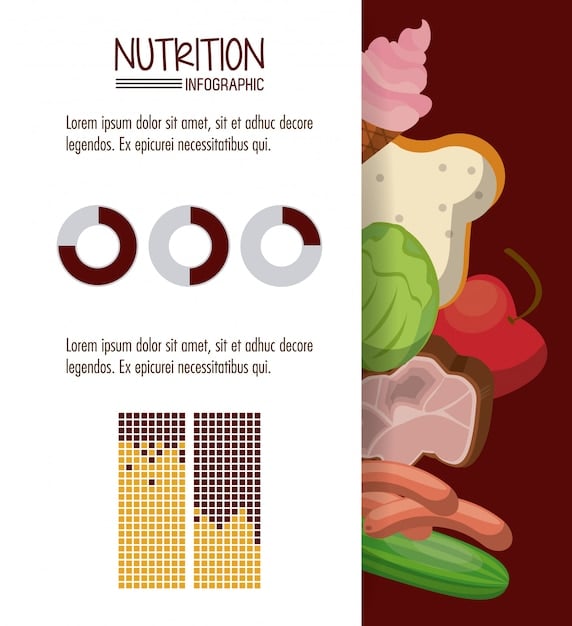Processed Food Linked to Depression Risk: New Research

New research reveals a concerning link between the consumption of processed foods and an increased risk of depression, highlighting the impact of diet on mental health.
A groundbreaking study has uncovered a significant correlation between the consumption of processed food consumption to increased risk of depression, raising serious concerns about the impact of modern diets on mental well-being.
The Link Between Processed Foods and Depression: What the Research Shows
Recent research has shed light on the connection between diet and mental health, specifically focusing on how processed foods can affect our mood and overall psychological well-being. This is a crucial area of study, considering the increasing reliance on processed foods in many diets.
Understanding this link can empower individuals to make more informed choices about their food consumption and take proactive steps to protect their mental health.
The Study’s Methodology
Researchers conducted a comprehensive analysis, examining the eating habits and mental health of a large group of participants over several years. Detailed questionnaires and dietary assessments were used to gather accurate data.
Key Findings
- Participants who consumed higher amounts of processed foods showed a significantly greater chance of experiencing symptoms of depression compared to those with diets rich in whole foods.
- The study also highlighted specific additives and ingredients commonly found in processed foods that may contribute to mood disorders.
- These findings underscore the importance of nutritional psychiatry, advocating for the integration of dietary approaches in mental health treatment.

In conclusion, the study adds to the growing body of evidence highlighting the importance of a balanced diet rich in whole foods for both physical and mental health. Its findings emphasize the potential risks associated with long-term consumption of processed foods.
Why Processed Foods Might Impact Mental Health
The relationship between processed foods and mental health is complex, involving various biological and psychological mechanisms. Several factors may contribute to the increased risk of depression associated with processed food consumption.
Understanding these mechanisms can help individuals make informed dietary choices to support their mental well-being.
Nutritional Deficiencies
Processed foods often lack essential nutrients, such as vitamins, minerals, and omega-3 fatty acids, which are vital for brain function and mental health. Diets high in processed foods may lead to nutrient deficiencies, impacting mood regulation and cognitive processes.
Inflammatory Responses
The high levels of refined sugars, unhealthy fats, and artificial additives in processed foods can trigger inflammatory responses in the body. Chronic inflammation has been linked to an increased risk of depression and other mental health disorders.
Gut Health
- Processed foods can negatively impact the gut microbiome, disrupting the balance of beneficial bacteria.
- An unhealthy gut microbiome can affect the production of neurotransmitters, such as serotonin, which play a crucial role in mood regulation.
- Maintaining a healthy gut is essential for overall well-being, including mental health.
Ultimately, the impact of processed foods on mental health is multifaceted, involving nutritional deficiencies, inflammatory responses, and disruptions to gut health. Addressing these factors through dietary changes and a focus on whole, nutrient-dense foods can support both physical and mental well-being.
Identifying Processed Foods in Your Diet
Recognizing processed foods in your diet is the first step toward making healthier choices. Processed foods come in various forms, and not all are equally harmful. Understanding what to look for can help you make informed decisions.
Here are some common categories of processed foods to be aware of.
Common Culprits
Certain types of processed foods are more likely to contribute to health problems due to their high levels of sugar, unhealthy fats, and artificial additives.
Ultra-Processed Foods
These foods are typically manufactured with numerous additives and undergo extensive processing. Examples include:
- Fast food items, such as burgers, fries, and pizzas
- Packaged snacks like chips, cookies, and candies
- Sugary drinks, including sodas, energy drinks, and sweetened juices

Tips for Identifying Processed Foods
Reading food labels carefully can help you identify processed foods in your diet. Look for long lists of ingredients, especially those you don’t recognize or can’t pronounce. Foods high in added sugars, sodium, and unhealthy fats are also indicators of processing. Choosing foods with fewer ingredients and a focus on whole, recognizable components can support a healthier diet.
Healthier Alternatives to Processed Foods
Switching to healthier alternatives can be a significant step in improving both your physical and mental health. By replacing processed items with whole, nutrient-dense foods, you can enhance your diet and overall well-being.
Here are some strategies for making these transitions.
Whole Foods Consumption
Prioritizing whole foods, such as fruits, vegetables, lean proteins, and whole grains, ensures you’re getting the essential nutrients your body needs. These foods are naturally rich in vitamins, minerals, and antioxidants, which support brain function and mental health.
Healthy Swaps
Simple substitutions can make a big difference. For example:
- Replace sugary drinks with water, herbal tea, or homemade smoothies.
- Choose whole-grain bread over white bread.
- Snack on nuts, seeds, or fresh fruit instead of packaged snacks.
Meal Preparation
Preparing your own meals allows you to control the ingredients and avoid the additives found in many processed foods. Planning your meals in advance and cooking at home can make healthy eating more manageable and enjoyable.
Making these dietary changes can improve your physical health and reduce the risk of depression associated with processed food consumption.
The Role of a Balanced Diet in Mental Health
A balanced diet is not just about physical health; it plays a crucial role in mental well-being. The foods we consume can directly impact our mood, cognitive function, and overall psychological health.
Here’s how a balanced diet supports mental health.
Nutrient Intake
A diet rich in essential nutrients provides the building blocks for neurotransmitters, which regulate mood and cognitive processes. Key nutrients for mental health include omega-3 fatty acids, B vitamins, and antioxidants.
Example Meal Plans
Creating a meal plan that supports mental health involves incorporating a variety of whole foods.
Breakfast
- Oatmeal with berries and nuts
- Greek yogurt with fruit and a drizzle of honey
Lunch
- Salad with grilled chicken or fish, mixed greens, and a variety of vegetables
- Whole-grain sandwich with lean turkey, avocado, and lettuce
Dinner
- Baked salmon with roasted vegetables
- Lentil soup with a side of whole-grain bread
By focusing on a balanced diet, you can nourish your brain and support your mental health, reducing the risk of depression and improving overall well-being.
Practical Steps to Reduce Processed Food Intake
Reducing processed food intake can seem daunting, but it becomes more manageable with a few practical strategies. Gradual changes and mindful choices can lead to a healthier lifestyle and improved mental health.
Here are some effective steps to reduce processed food intake.
Planning Your Meals
Meal planning is a key strategy for reducing processed food intake. By planning your meals in advance, you’re more likely to make healthy choices and avoid last-minute decisions that often lead to processed options.
Grocery Shopping Strategies
When grocery shopping, focus on the perimeter of the store, where fresh produce, lean proteins, and dairy products are typically located. Minimize your trips down the aisles filled with processed foods.
Label Reading
- Pay attention to serving sizes and nutritional information.
- Look for hidden sugars, unhealthy fats, and high sodium levels.
- Choose products with fewer ingredients and recognizable words.
Adopting these practical steps can make a significant difference in reducing your processed food intake and enhancing your overall diet.
| Key Point | Brief Description |
|---|---|
| 🍳 Processed Foods | High in sugars, fats, and additives; linked to increased depression risk. |
| 🧠 Mental Health | Diet impacts mood; processed foods can trigger inflammation and disrupt gut health. |
| 🍎 Whole Foods | Nutrient-rich; support brain function and reduce depression risk. |
| 🛒 Practical Steps | Meal planning, smart grocery shopping, and label reading help reduce processed food intake. |
Frequently Asked Questions
▼
Avoid ultra-processed items such as fast food, packaged snacks, and sugary drinks, which are high in unhealthy fats, sugars, and artificial additives.
▼
Processed foods can disrupt the gut microbiome by reducing beneficial bacteria and increasing harmful bacteria, impacting neurotransmitter production.
▼
Focus on omega-3 fatty acids, B vitamins, and antioxidants, which are crucial for brain function and mood regulation, found in whole foods.
▼
Start by meal planning, reading food labels, and focusing on the perimeter of the grocery store, where fresh, whole foods are typically located.
▼
Opt for snacks like nuts, seeds, fresh fruit, or homemade smoothies instead of packaged chips, cookies, and candies to nourish your body.
Conclusion
In conclusion, the link between processed food consumption and increased risk of depression is a critical consideration for overall well-being. By making informed dietary choices and prioritizing whole, nutrient-dense foods, individuals can support their mental health and reduce the risk of mood disorders. Embracing a balanced diet contributes to a healthier, happier life.





